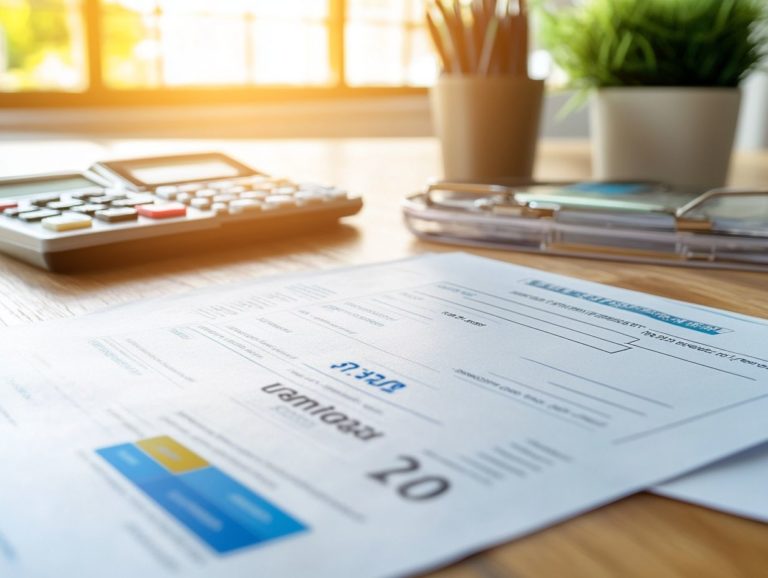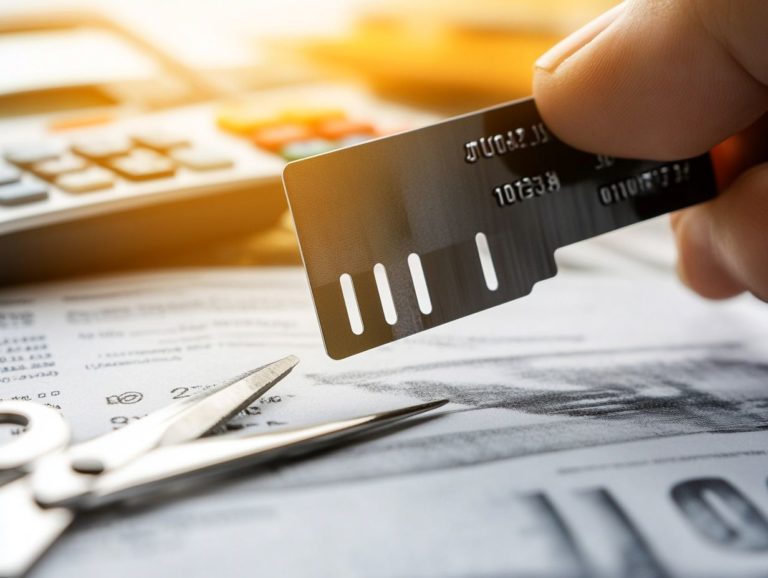Understanding the Impact of Debt on Credit Scores
Managing debt effectively is essential in today s financial landscape. It is particularly important for maintaining a healthy credit score.
This article explores the relationship between debt and credit scores. It highlights how different types of debt can affect your financial standing.
By grasping these concepts, you empower yourself to take charge of your financial future with confidence.
Contents
- Key Takeaways:
- Defining Debt and Credit Scores
- How Debt Affects Credit Scores
- Types of Debt and Their Impact on Credit Scores
- Managing Debt for Better Credit Scores
- Rebuilding Credit After Debt
- Frequently Asked Questions
- What is debt and how does it affect my credit score?
- Can having no debt affect my credit score?
- How does the amount of debt I have compared to my credit limit affect my credit score?
- Will paying off my debt immediately improve my credit score?
- Can my credit score be affected by the type of debt I have?
- How can I use debt to improve my credit score?
Key Takeaways:

- Knowing how debt and credit scores differ is key to managing your finances.
- The types of debt you have, such as revolving or installment, can have varying impacts on your credit score.
- Proper management of debt, including responsible credit usage and strategic debt repayment, can lead to an improved credit score over time.
Defining Debt and Credit Scores
Understanding debt and credit scores is essential for managing your financial health and making informed lending decisions. Debt represents the money you owe to creditors, significantly influencing your credit score a numerical representation of your creditworthiness.
This score is shaped by various factors, including your payment history, credit utilization, and the types of credit accounts you hold. A strong credit score is crucial for securing favorable interest rates and loan amounts from financial institutions.
By regularly monitoring your credit report, you can identify outstanding balances and effectively manage your credit obligations.
How Debt Affects Credit Scores
Debt plays a crucial role in shaping credit scores, directly affecting several key components of the credit scoring system, such as your credit utilization ratio and payment history. High balances, especially on credit cards, can lead to a significant dip in your credit score if not managed with care.
When lenders examine your credit report, they evaluate your total debt in relation to your available credit. This helps them gauge risk factors, including the probability of late payments.
Outstanding balances on installment loans also influence lending decisions, underscoring the importance of maintaining a healthy credit profile.
Factors that Contribute to Credit Score Changes
Several factors influence changes in your credit score, including payment history, credit utilization, and those pesky hard inquiries that lenders make when you apply for new credit. Get to know these elements to boost your creditworthiness!
Payment history makes up roughly 35% of most credit scoring models. A single missed payment can leave a lasting mark on your score. The credit utilization ratio, best kept under 30%, indicates how much credit you re using compared to what s available. Continuously maxing out your credit cards can paint a picture of financial instability.
Maintaining a diverse array of credit accounts from revolving credit lines to installment loans not only improves your credit mix but also demonstrates reliability to potential lenders. While hard inquiries account for about 10% of your total score, consistently applying for credit can signal risk, potentially dragging your creditworthiness down.
Types of Debt and Their Impact on Credit Scores

Understanding the various types of debt is crucial, as each category uniquely influences your credit score and shapes how lenders perceive your creditworthiness.
For instance, revolving accounts, like credit cards, permit ongoing borrowing up to a set limit. Their effect on your score is significantly determined by your credit utilization ratio. On the other hand, installment loans, such as auto loans and mortgages, consist of fixed payments made over time, showcasing a consistent payment pattern in your credit history.
When managed responsibly, a balanced mix of these debt types can enhance your credit score and bolster your financial standing.
Revolving Debt vs. Installment Debt
Revolving debt and installment debt each play unique roles in your financial profile, influencing your credit score in distinct ways.
Revolving debt, like credit card balances, fluctuates based on how much you re utilizing at any given moment, which affects your credit utilization ratio the amount of credit you’re using compared to your total credit limit.
On the other hand, installment debt involves fixed monthly payments, creating a more predictable payment history that can positively boost your credit score. Understanding these differences is crucial for effective debt management and maintaining a strong credit score.
This understanding gives you the power to navigate your financial decisions wisely, ensuring you don t over-leverage your credit cards.
Establishing a reliable repayment routine for loans, such as mortgages or auto financing, is equally important. One key strategy for managing revolving debt is to keep your utilization below 30% of your credit limit; this practice helps build a strong credit profile.
For those with installment debt, consistently making on-time payments not only builds your credibility but also enhances your reputation with lenders, showing you can manage your financial obligations responsibly. By harmonizing both approaches, you can significantly elevate your creditworthiness.
Managing Debt for Better Credit Scores
Effectively managing debt is essential for maintaining and elevating your credit score, requiring a blend of strategic planning and disciplined financial habits.
Key strategies for your success include:
- Make timely monthly payments,
- Reduce credit card balances to improve your credit utilization ratio, and
- Avoid unnecessary debt accumulation.
By adopting a proactive debt management plan, you can enhance your credit profile, ultimately unlocking access to superior lending options and more favorable interest rates.
Strategies for Paying Off Debt
Paying off debt demands a well-crafted strategy, particularly when navigating high-interest credit card debt and various installment loans.
One highly effective method is the avalanche technique, where you focus on tackling the debts with the highest interest rates first. This method can dramatically lower your total payments over time, giving you more financial freedom!
The snowball method lets you pay off smaller debts first, offering quick wins that can fuel your motivation. No matter which path you choose, establishing a clear plan with financial institutions can enhance your chances of successful debt repayment.
Consolidating debt through a loan presents another compelling strategy, enabling you to merge multiple debts into a single payment, potentially at a lower interest rate. This not only simplifies your monthly payments but may also reduce your overall expenses.
However, consolidation carries its own risks, such as extending your repayment period and potentially accumulating more interest in the long run. It s essential to evaluate each option in light of your personal financial situation.
Setting a budget that incorporates debt repayments while cutting unnecessary expenses can fortify your commitment. Regularly reviewing your progress allows you to celebrate milestones and maintain motivation throughout your repayment journey.
Using Credit Responsibly

Using credit responsibly is crucial for maintaining a healthy credit score and meeting your credit obligations. This means understanding your available credit limits and keeping your credit utilization ratio low ideally below 30%.
Timeliness in making payments plays a significant role in establishing a positive payment history, which greatly influences your credit score. Don’t wait set up automatic payments now to protect your credit score!
By adopting responsible borrowing habits, you can enhance your overall financial stability and gain access to better credit products down the line. Consistently monitoring your credit reports for inaccuracies is just as important, as any errors can harm your credit standing.
Setting up automatic payments can also be a game-changer this way, you ensure your bills are paid on time, minimizing the risk of late fees and missed deadlines.
It’s wise to diversify your credit types appropriately, balancing installment loans and revolving credit to demonstrate to lenders that you can manage various debts effectively. Ultimately, cultivating responsible credit habits lays a solid foundation not only for your immediate borrowing needs but also for fostering long-term financial health and securing a robust economic future.
Start implementing these strategies today for a brighter financial future!
Rebuilding Credit After Debt
Rebuilding your credit after accumulating debt is a challenging yet rewarding endeavor. It focuses on restoring your credit score and improving your finances.
One effective approach is to use services that help you track your credit. These services allow you to monitor your credit score and stay informed about any changes. Options like secured credit cards and credit-builder loans can significantly boost your journey by providing opportunities to demonstrate responsible usage and make timely payments.
By actively managing your credit profile, you can steadily elevate your creditworthiness and pave the way for a brighter financial future.
Steps to Improve Credit Score
Improving your credit score involves a blend of consistent actions and effective strategies designed to enhance your credit profile over time. Begin by monitoring your credit reports for inaccuracies and addressing any discrepancies that could negatively influence your score.
Regularly paying down your debt and keeping a low credit utilization ratio are essential steps. Building a positive payment history through timely payments to financial institutions significantly enhances your overall credit health.
To further elevate your credit standing, consider setting up automatic payments to ensure that no bills are missed. This is critical since even a single late payment can leave a lasting mark on your credit score. Consider seeking credit counseling for personalized advice tailored to your unique financial situation, empowering you to manage your credit more effectively.
For example, consolidating high-interest debts into one lower-interest loan can simplify your finances while improving your debt-to-income ratio the amount you owe compared to your income ultimately boosting your credit score. Engaging in these strategic actions can lead to enduring improvements, opening doors to financial opportunities such as securing loans with more favorable terms.
The Importance of Understanding Debt and Credit Scores
Understanding debt and credit scores is crucial for anyone looking to navigate the intricate world of personal finance and lending. By grasping how these elements interact, you can position yourself more effectively when applying for loans, mortgages, or even credit cards.
For instance, knowing how to maintain a healthy credit utilization ratio can lead to lower interest rates and better loan terms, saving you considerable amounts over time. Being aware of the repercussions of late payments or high debt levels can inspire you to adopt proactive habits, such as making timely bill payments or considering debt consolidation.
This awareness cultivates a sense of financial responsibility and empowers you to build a more secure economic future, enabling you to pursue your goals with increased confidence.
Frequently Asked Questions

What is debt and how does it affect my credit score?
Debt refers to the amount of money you owe to lenders or creditors. Any type of debt, such as credit card balances, loans, or mortgages, can impact your credit score. High levels of debt can lower your credit score, while paying off debt can improve it.
Can having no debt affect my credit score?
Surprisingly, having no debt can actually hurt your credit score. Lenders and credit agencies use your credit history to assess your creditworthiness. Without any debt, there is no history to show how responsible you are with borrowing and repaying money, which can lead to a lower credit score.
How does the amount of debt I have compared to my credit limit affect my credit score?
The amount of debt you have in relation to your credit limit is known as your credit utilization ratio. This ratio is crucial in determining your credit score. High credit utilization can signal to lenders that you may be overextended and have trouble managing your debt. Experts recommend keeping your credit utilization below 30% for optimal credit score health.
Start taking control of your credit today!
Will paying off my debt immediately improve my credit score?
Paying off debt can positively impact your credit score. However, the effects might not show up right away.
Credit bureaus need time to update your report. If you have other negative factors, the change might not be significant.
Can my credit score be affected by the type of debt I have?
Yes, the type of debt matters. For instance, installment loans, like car loans, generally affect your score less than revolving credit, such as credit card debt.
Installment loans have fixed repayment schedules. In contrast, revolving credit can fluctuate, leading to higher debt levels.
How can I use debt to improve my credit score?
Using debt wisely can boost your credit score. Make timely payments and keep your credit utilization low to show lenders you manage debt well.
Having a mix of debt types, like installment loans and credit cards, can also help your score.






